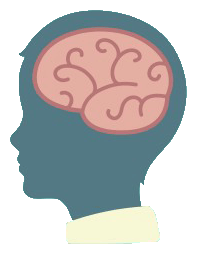We like to keep our bodies active and fit, but why don't we do the same for our brain? We know when we neglect our body by doing little or no exercising, our body will age faster. But if you won't keep your brain active, you will also have a chance of deteriorating your cognitive age. Some people think reading or learning a little is enough, research shows otherwise. Research has shown that the variation of our mental activities is the key a young and fit brain. Brain training requires more than reading texts, but how do you train your brain? And what about the brain games with which people train their brain?
Before we discuss how you can influence the aging of your brain, by, for example, brain training with brain games, we answer the question: “What happens to our brain as we get older?”. We want to keep our brain as young and fit as possible, but there is a lot going on in your brain that can be explained.
During your first few years as a child, more than 1 million new neural connections are formed per second. During this period, up to the moment you go to school for the first time, the size of your brain increases four times. When you reach the age of six, your brain has reached about 90 per cent of its maximum volume.
After this, most growth takes place in the frontal lobes until you are way past twenty years old. These frontal lobes are responsible for planning, organizing and task-oriented attention. From your sixth until puberty, the temporal and partial lobes grow a lot. These are responsible for the development of your language skills and spatial insights. Nowadays, they teach classes in schools with the use of a brain game or other variant of brain training.
During your third until your fifteenth year, many changes take place in your brain. Some areas of the brain can even double in one year.
During your teenage years, the rational part of your brain won't fully develop. This development will last until about the age of 25 or even longer. The brain of a teenager works differently from that of an adult person, but what caused this? This is because adults think with their prefrontal cortex, this is the rational part of the brain. This section responds with a good sense of judgement and consequence to situations. The brain of a teenager processes information within the amygdala. The amygdala is the emotional part of the brain.
According to the latest studies, your brain achieves its peak performance between the age of 16 to 25. After your 25th, your cognitive functioning will decrease. Between the age of 20 and 90, your brain loses about 5 to 10% of its weight. The functioning of the prefrontal cortex will also reduce during these years. This is associated with the deterioration of the working memory.
Around your 35th, your frontal lobes are fully developed. These are responsible for functions planning, impulse control and the working memory.
No, in fact, a study has shown that new brain cells are formed in the thousands, even when you are older. Mental problems aren't caused by a loss of brain cells, but to the communication between brain cells.
Common memory changes associated with normal aging are:
- Having trouble learning something;
- Having trouble with multitasking;
- Having trouble remembering names, remembering numbers and remembering appointments.
Brain training programs with, for example, brain games are adjusted to this. This results in the activation of the communication between brain cells.
You cannot do anything against aging yourself. But you can ensure that you can experience less of the negative effects of aging. You can also train your brain yourself, provided you do this in the right way. There are ways that you can keep your brain younger and fitter, like:
Exercising is proved to be healthy to keep your brain young and fitter. A combination of condition and resistance exercises with moderate intensity is advised. Exercising for at least 45 minutes per session, for as many days a week as possible, increases the strength of your brain. View this article for more about the impact of sports on your brain.
This means that the difficulty of your brain training needs to be adjusted to your own level. A simple example is a darts when you want to start with darts you have to practice. Of course, you won't practice by standing meters from the board for the first time. Just like you won't stand a meter in front of the board when you are starting to get better at it. Train your brain in a way that adapts to your own level. With adaptive training, you will always challenge your brain.
Your memory does not consist of one component, it consists of several memory systems. With a varied training, you stimulate all the senses and memory systems. This makes your brain remember things faster.
Repetition is really important for your brain. By repeating, your brain will eventually remember more. This also makes it easier for your brain to retrieve information. Do you want a younger and fitter brain? If so, you should train your brain every single day, even if it is just a few minutes a day.


